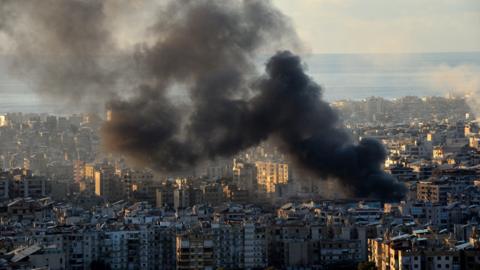He said ending fighting in Lebanon would also give the IDF space to resupply weapons, munitions and troops.
Israeli commentators had noted that the country's military was not ready nor equipped to fight two wars on two fronts over an extended period of time.
Ending the conflict in Lebanon thus could also free up more Israeli forces to serve in Gaza, a conflict which shows no sign of ending.
At the White House on Tuesday, Biden was asked about a ceasefire in Gaza and said his government was working with other negotiators Turkey, Egypt and Qatar to "make another push" on a deal.
The US, Israel's key backer, had led the charge with France in negotiating the deal in Lebanon.
France, which administered Lebanon for more than 20 years in the last century, is also a long-term ally and is expected to be involved through the monitoring of the truce. Biden confirmed that no US troops would be deployed to managing the ceasefire.
The war has been devastating for Lebanon, where, in addition to the 3,823 people killed and 15,859 injured, one million residents have been displaced in areas where Hezbollah holds sway.
Lebanon's Prime Minister Najib Mikati welcomed the ceasefire deal, calling it a "fundamental step towards restoring calm and stability" in the country and allowing citizens to return home.
But he also demanded that Israel "fully comply" with the deal, withdraw from the sites it currently occupies and to respect the UN resolution previously set at the end of the last Hezbollah-Israel war in 2006.
Israel went on the offensive against Hezbollah - which is proscribed as a terrorist organisation by Israel and many Western countries - after almost a year of cross-border fighting sparked by the war in Gaza.
It has said it wants to ensure the safe return of about 60,000 residents of northern Israeli areas displaced by rocket attacks, which Hezbollah launched in support of Palestinians.
Hezbollah attacks on Israel and the occupied Golan Heights have killed at least 75 people, more than half of them civilians, while more than 50 soldiers have been killed in combat in southern Lebanon, according to Israeli authorities.
The World Bank estimates $8.5bn (£6.8bn) in economic losses and damage in Lebanon. Recovery will take time, and it is unknown how this will be funded.
Hezbollah, too, has been devastated. Many of its leaders have been killed, including long-time chief Hassan Nasrallah, in an IDF strike on Beirut on 27 September. A week later Israel also killed his presumed successor, Hashem Safieddine, in another strike.
With much of its infrastructure also damaged, how Hezbollah will look after the war remains unclear. The group has been severely weakened but it has not been destroyed.
In Lebanon, it is also more than a militia: it is a political party with representation in parliament, and a social organisation, with significant support among Shia Muslims.
Hezbollah’s opponents could see it as an opportunity to limit its influence - it was often described as “a state within a state” in Lebanon before the conflict - and many fear this could lead to internal violence.
Since intensifying the fighting in September, Israel has carried out hundreds of daily strikes in Lebanon, targeting what it said were Hezbollah areas in the south, east and in the capital Beirut.
As reports emerged that Netanyahu was discussing a ceasefire deal with his cabinet on Tuesday, the IDF continued its strikes - targeting Beirut with strikes that killed at least 10 people.
